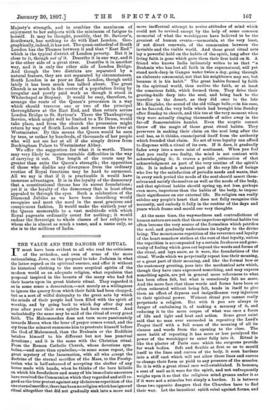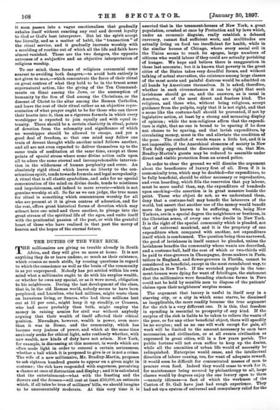THE VALITE AND THE DANGER OF RITUAL. IT must have
been evident to all who read the criticisms of the orthodox, and even of some of the more rationalising, Jews, on the proposal to take Judaism in what the latter regard as its spiritual essence, and offer it without its historical clothing to the more sceptical spirits of the modern world as an adequate religion, what repulsion that proposal inspired in the breasts of the many who had fed their hearts upon its great historic ritual. They regarded it as in some sense a desecration,—not merely as a willingness to ignore the quarry from which their faith had been chopped, but as a sort of wilful disloyalty to the great acts by which the minds of their people had been filled with the spirit of worship, and by going back to which day after day and year after year their own spirits had been renewed. And undoubtedly the same may be said of the ritual of every great faith. The Mahommedan does not turn more passionately towards Mecca when the hour of prayer comes round, and the cry from the minaret summons him to prostrate himself before the God of Mahommed, than the Brahmin or the Buddhist betakes himself to his different but not less punctual devotions ; and it is the same with the Christian ritual. From the Roman Catholic Church, whose devotions sym- bolise,—and more than symbolise,—in some sense repeat, the great mystery of the Incarnation, with all who accept the doctrine of the eternal sacrifice of the Mass, to the Presby- terian who is half-ashamed of accepting the shelter of any house made with hands, when he thinks of the bare hillside on which his forefathers and many of his immediate ancestors have received the Communion which they regarded and still re- gard as the true protest against any idolatrous repetition of the one eternal sacrifice, there has been no religion which has ignored ritual altogether that did not gradually sink into a more and
more ineffectual attempt to revive attitudes of mind which could not be revived except by the help of some common memorial of what the worshippers have believed to be the greatest of human events,—memorials, at the very least, if not direct renewals, of the communion between the invisible and the visible world. And these great ritual acts lay a powerful hold on the habits of the spirit, long after the living faith is gone which gave them their first hold on it. A friend who knows India intimately writes to us that "a Brahmin who has lost all faith in the supernatural, will yet stand neck-deep in Ganges water twice a day, going through an elaborate coremonial, not that his neighbours may see, but because it is his habit." The great habits formed by faith in the spiritual world, thus outlive the faith, or at least the conscious faith, which formed them. They drive their graving-knife deep into the soul, and bring back to the traveller in the desert, as they did once to the late Mr. Kinglake, the sound of the old village belle ;—in his case, as he fancied, the very bells which had brought him Sunday after Sunday to church, and this too at the very moment when they were actually ringing thousands of miles away in the far-off Somersetshire hamlet. Even the sceptic cannot throw off the magic of these great ritual habits. They persevere in making their claim on the soul long after the soul has, as it thinks, emancipated itself from the authority which founded that claim. No act of true loyalty can afford to dispense with a ritual of its own. If it does, it gradually fades away into a mere mist of sentiment. When you feel that you really owe fealty, the mind is not content with acknowledging it; it craves a public reiteration of that acknowledgment as part of the very routine of the spirit's life. It is indeed a natural part of the very life of beings who live by the satisfaction of periodic needs and wants, that in every such period the needs of the soul should assert them- selves and satisfy themselves as well as the needs of the body, and that spiritual habits should spring up, not less, perhaps even more, imperious than the habits of the body, to impose their significance on our external life. No religion can really subdue any people's heart that does not fully recognise this necessity, and embody it fully in the routine of the days and years which frame and mould our very thoughts.
At the same time, the waywardness and contradictions of human nature are such that these imperious spiritual habits too often become the very source of the formalism which petrifies the soul, and gradually undermines its loyalty to the divine being. The monotonous repetition of the reverence and loyalty of the heart somehow strikes at the root of that loyalty, unless the repetition is accompanied by a certain freshness and gene- rosity of feeling which goes out beyond the words and forms of the ritual, and lays anew, as it were, the foundations of the ritual. Words which we perpetually repeat lose their meaning, or a great part of their meaning, and like the formal bow or the customary greeting, pass into the mechanical acts which, though they have once expressed something, and may express something again, are yet in general mere references to what has been often felt., but what is consciously felt no more. And the mere fact that these words and forms have been so often reiterated without being felt, tends in itself to give them an effect of dryness and insignificance very injurious to their spiritual power. Without ritual you cannot really perpetuate a religion. But with it you are always in danger of embalming it, of making a mummy of it, and reducing it to the mere corpse of what was once a focus of life and light and heat and action. Some great saint said that no man ever succeeded in repeating the Lord's Prayer itself with a full sense of the meaning of all its clauses and words from the opening to the close. The mere habit of repeating it has more or less paralysed the power of the worshipper to enter fully into it. Ritual is like the plaster of Paris case which the surgeons provide for weak bodies. Soft and flexible at first so as to mould itself to the lines and curves of the body, it soon hardens into a stiff cast which will not allow those lines and curves to change their form or yield to any pressure of the muscles. So it is with a great ritual once well-established. It become5 a coat of mail as it were for the spirit, and not unfrequently weighs upon it so that the religious mind groans under it as if it were not a stimulus but simply a burden. It is between these two opposite dangers that the Churches have to find their way. Let the impatient spirit rebel against forms, and
it soon passes into a vague emotionalism that gradually exhales itself without exacting any real and devout loyalty to God or God's best interpreter. But let the spirit accept too literally, and as a matter of habit, the " transaction " of the ritual service, and it gradually incrusts worship with a moulding of routine out of which all the life and faith have almost vanished. These are the two dangers, the opposite extremes of a subjective and an objective interpretation of religious worship.
To our mind, those forms of religious ceremonial come nearest to avoiding both dangers,—to avoid both entirely is not given to man,—which concentrate the force of their ritual on great centres of what they hold to be in the truest sense supernatural action, like the giving of the Ten Command- ments on Sinai among the Jews, or the assumption of humanity by the Son of God among the Christians, or the descent of Christ to the altar among the Roman Catholics, and leave the rest of their ritual rather as an objective repre- sentation of what prayer ought to be for those who can throw their hearts into it, than as a rigorous formula in which every worshipper is expected to join equally and with equal in- tensity. There should be a certain elasticity in ritual, points of devotion from the solemnity and significance of which no worshipper should be allowed to escape, and yet a good deal of freedom, so that one mind may follow one train of devout thought while another mind follows another, and all are not even expected to deliver themselves up to the same train of meditation at the same time, except at those points of special stress where some divine action calls upon all to adore the same eternal and incomprehensible interven- tion in the wilderness of human perplexity and error. An absolutely rigid ritual which leaves no liberty to the con- scientious spirit, tends towards formula and legal scrupulosity. A ritual that is all elastic symbolism, and asks for no special concentration of the mind on divine deeds, tends to mistiness and impulsiveness, and indeed to mere reverie—which is not genuine worship at alL So far as we can judge, the true mean for ritual is something which concentrates worship for all who are present at it in given centres of adoration, and for the rest, offers great historical forms of devotion which may attract here one mind and there another, to plunge into the great stream of the spiritual life of the ages, and unite itself with the penitential passion of the past, or with the grateful heart of those who have realised in that past the mercy of heaven and the hopes of the eternal future.



















































 Previous page
Previous page